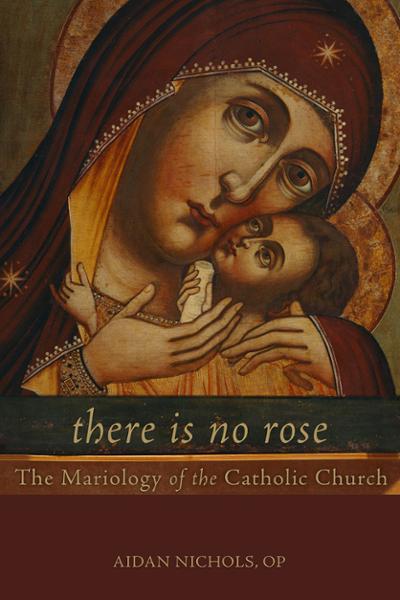Mary continues to be a source of theological interest and concern for Catholics and Protestants alike. For Catholics, Mariology was codified in a set of dogmas over the centuries; yet many Catholics remain unaware of the biblical, historical, and theological matrix that gave rise to the magisterial teaching. Protestants, with some exceptions, remain skeptical of Marianism in Catholic theology, viewing such as intrusions upon biblical doctrine and faith or unnecessary accretions threatening of sound Christian theology. Aidan Nichols, OP, attempts to address this “puzzlement” of Mary.
Working through the biblical, patristic, and medieval sources, Nichols introduces readers to the robust scriptural and theological bases for the Church’s celebration of Mary in its doctrine and liturgy, alongside the work of the Councils and the magisterium, to argue for the crucial relevance of Mary in the theological articulation of the gospel, the celebration and practice of the liturgy, and the sacramental life of the Church. The present study aims to contribute to the revival of a more full-blooded Marian teaching and attempts to take the path set by ressourcement theology in recovering the robust voice of witness to Mary.
Working through the biblical, patristic, and medieval sources, Nichols introduces readers to the robust scriptural and theological bases for the Church’s celebration of Mary in its doctrine and liturgy, alongside the work of the Councils and the magisterium, to argue for the crucial relevance of Mary in the theological articulation of the gospel, the celebration and practice of the liturgy, and the sacramental life of the Church. The present study aims to contribute to the revival of a more full-blooded Marian teaching and attempts to take the path set by ressourcement theology in recovering the robust voice of witness to Mary.
- Format Paperback
- ISBN 9781451484465
- eBook ISBN 9781451494167
- Pages 187
- Dimensions 6 x 9
- Publication Date February 1, 2015
Endorsements
“Those who have been paying attention recognize that Aidan Nichols, not least through his pellucid writings over the past decade, has emerged as the greatest English-speaking dogmatic theologian of our era. Only Father Nichols could have written this book, which amiably unites voices from all periods of the church’s theology and unfolds with winsome precision Mary’s place in the history of salvation and the communion of saints. This book is a dogmatic, historical, and symphonic masterpiece.”
—Matthew Levering
Mundelein Seminary
“Fr. Nichols writes with an attractive, lucid, and engaging style. The methodology which he adopts admirably displays the fruitfulness of ressourcement in returning to Scripture, patristic, and scholastic sources, while also engaging with conciliar teachings, magisterial texts, and contemporary writers. Masterly expositions of the development of the Catholic doctrines about the immaculate conception and the assumption are given. These are sensitively coupled with sound critical comment on the more controversial Marian titles of co-redemptrix and mediatrix of graces. The treatment of divine motherhood is particularly fine. Likewise, the author’s concern for balance between the christo-typical and ecclesio-typical dimensions in sketching Mary’s relationship to the church is most helpful. These concerns are creatively linked with insights from Orthodox Mariology and the riches of the iconographical tradition. This book will be of interest to students of ecclesiology and ecumenism and to all who take seriously the important place of Mary in both doctrine and devotion.”
—Finbarr G. Clancy, SJ
Milltown Institute of Theology and Philosophy, Dublin
“In a book that is brief and seeker-friendly, Father Nichols offers a clear and succinct introduction to the shape of Marian doctrine. Drawing from sacred Scripture, the early Fathers, the church’s living tradition, and liturgy, Nichols summarizes the theological development of the Marian dogmas in a way that is Christocentric and ecumenical. This Rose is a marvel of economy, tracing the divine logic of love and fittingness, demonstrating that Mary is the one who exemplifies the perfection of Christ’s redeeming work. There are few books of such virtue.”
—Scott Hahn
Franciscan University of Steubenville and Mundelein Seminary
“Crystal clear, compendious, and compact, this book is a brilliant and useful introduction to Mariology. In it we see a master craftsman at work in Christian theology.”
—Francesca Murphy
University of Notre Dame
—Matthew Levering
Mundelein Seminary
“Fr. Nichols writes with an attractive, lucid, and engaging style. The methodology which he adopts admirably displays the fruitfulness of ressourcement in returning to Scripture, patristic, and scholastic sources, while also engaging with conciliar teachings, magisterial texts, and contemporary writers. Masterly expositions of the development of the Catholic doctrines about the immaculate conception and the assumption are given. These are sensitively coupled with sound critical comment on the more controversial Marian titles of co-redemptrix and mediatrix of graces. The treatment of divine motherhood is particularly fine. Likewise, the author’s concern for balance between the christo-typical and ecclesio-typical dimensions in sketching Mary’s relationship to the church is most helpful. These concerns are creatively linked with insights from Orthodox Mariology and the riches of the iconographical tradition. This book will be of interest to students of ecclesiology and ecumenism and to all who take seriously the important place of Mary in both doctrine and devotion.”
—Finbarr G. Clancy, SJ
Milltown Institute of Theology and Philosophy, Dublin
“In a book that is brief and seeker-friendly, Father Nichols offers a clear and succinct introduction to the shape of Marian doctrine. Drawing from sacred Scripture, the early Fathers, the church’s living tradition, and liturgy, Nichols summarizes the theological development of the Marian dogmas in a way that is Christocentric and ecumenical. This Rose is a marvel of economy, tracing the divine logic of love and fittingness, demonstrating that Mary is the one who exemplifies the perfection of Christ’s redeeming work. There are few books of such virtue.”
—Scott Hahn
Franciscan University of Steubenville and Mundelein Seminary
“Crystal clear, compendious, and compact, this book is a brilliant and useful introduction to Mariology. In it we see a master craftsman at work in Christian theology.”
—Francesca Murphy
University of Notre Dame
